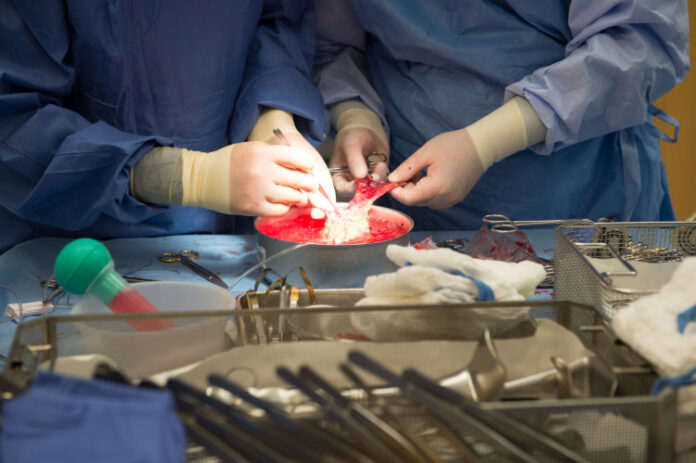by Tyler Durden
Authored by Susan Crabtree via RealClearPolitics,
A group of leading China critics in Congress is urging the State Department to step up its efforts to curb Beijing’s gruesome $1 billion forced organ harvesting trade, which targets ethnic and religious minorities, including Uyghurs, Tibetans, Muslims, Christians, and Falun Gong practitioners.
Six members of the Congressional-Executive Commission on China, or CECC, sent a letter last week to Secretary of State Antony Blinken asking him to utilize existing agency reward programs to provide monetary incentives for information that will “deter and disrupt the market for illegally procured organs” in China. Rep. Chris Smith, who chairs the CECC, and Sen. Marco Rubio, the commission’s ranking member, joined Democrat Rep. Jennifer Wexton of Virginia and GOP Reps. Michelle Steel of California, Zach Nunn of Iowa, and Ryan Zinke of Montana in signing the letter.
The State Department manages two programs that offer awards of up to $25 million for information leading to the arrest and/or conviction of members of significant transnational criminal organizations. One focuses on violators of U.S. narcotics law, and another targets other crimes that threaten U.S. national interests, including human trafficking, wildlife trafficking, cybercrime, money laundering, and trafficking in arms and other illicit goods.
“We strongly support the Department of State’s efforts to issue rewards for wildlife and narcotics trafficking in the [People’s Republic of China],” the lawmakers wrote. “However, given the global demand for organ transplants and the evidence of the illegal trafficking of organs in the PRC, there is a pressing need to uncover first-hand information from those who witnessed or engaged in the practice.”
The State Department didn’t respond to a request for comment.
Communist China has long harvested prisoners’ organs, even though the government in Beijing initially asserted that all their organ extractions were from voluntary donors. But as far back as 2005, the top transplant doctor in China, then serving as the nation’s vice minister of health, admitted that roughly 95 percent of all organ transplants came from prisoners.
In recent years, leading researchers have documented a reprehensible aspect of these life-ending extractions: Prisoners of conscience – religious minorities and political dissidents are the main victims. There’s now extensive evidence that Chinese surgeons first honed their murderous organ harvesting practices on practitioners of Falun Gong, a meditation and exercise movement. In recent years, the regime expanded its pool of victims to China’s imprisoned Uyghur population as part of its systematic oppression of the Muslim minority group.
China has vehemently denied these claims, but in 2019, the China Tribunal, a non-governmental, independent commission in the U.K., concluded otherwise. The Tribunal investigated accusations of organ harvesting in China and found that some of the more than 1.5 million detainees in Chinese prison camps are being killed for their organs to serve
a booming transplant trade worth an estimated $1 billion a year. The Tribunal also found that the Chinese organ trafficking industry is harvesting organs from executed prisoners and political prisoners at an industrial scale, actions that constitute crimes against humanity.
In response to the Tribunal’s findings, more than a dozen United Nations human rights experts said they were extremely alarmed by reports that organ harvesting was targeting “specific ethnic, linguistic or religious minorities, including Uyghurs, Tibetans, Muslims, and Christians” detained in China. The experts, who operate under United Nations mandates but do not speak on the international organization’s behalf, called on China to respond to the allegations of illegal organ harvesting promptly and to allow international human rights monitors into hospitals and other areas to monitor the country’s organ extraction practices. China has ignored those requests.
In 2022, the American Journal of Transplantation, the leading medical transplant publication in the world, published a peer-reviewed article that uncovered compelling evidence that Chinese surgeons are systematically removing organs from prisoners while they are still alive, providing on-demand supplies for China’s organ export industry.
The practice violates the internationally accepted “dead-donor” rule that holds that organ procurement “must not commence until the donor is both dead and formally pronounced so.”
“Forced organ harvesting is an atrocity, and the disruption and deterrence of this practice should be a priority of the State Department,” the group of lawmakers wrote.
“Getting the PRC to account and fully address evidence of forced organ harvesting will be critical in ending this horrific practice and promoting, long term, the establishment of a truly voluntary organ donation system,” they continued. “With effective enforcement mechanisms, we can work towards ensuring organs are procured safely and ethically.”
Susan Crabtree is RealClearPolitics’ national political correspondent.



